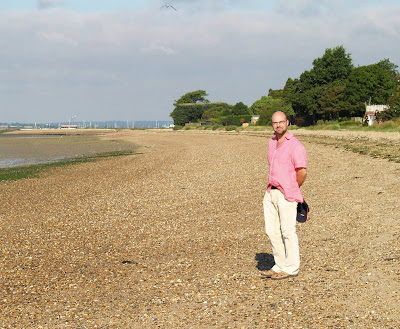Monthly Archives: August 2007
TBTM20070804

Had the great pleasure of a guest staying the last couple of days, with whom I trained, and who is now the vicar here.
TBTM20070803
On being saved
Something a bit more positive about the atonement, still in the form of notes. Click ‘full post’ for text.
‘Christianity is not a doctrine, not, I mean, a theory about what has happened and will happen to the human soul, but a description of something that actually takes place in human life. For ‘consciousness of sin’ is a real event and so are despair and salvation through faith. Those who speak of such things (Bunyan for instance) are simply describing what has happened to them, whatever gloss anyone may want to put on it.’
So wrote Wittgenstein, and this remains one of the clearest descriptions of what I take Christianity to be – it is something which actually takes place in our lives (it transforms our lives) – it is not theory-driven (as if we have been given the equivalent of laws of physics, just relating to those things that cannot be seen); rather it is directly driven by a change of life. This is one of the major reasons why I think atheists just don’t ‘get it’. They misunderstand the grammar of faith – but that’s a separate argument. Trouble is, a lot of self-proclaimed Christians also don’t get it – in precisely the same way. “A theology which insists on the use of certain particular words and phrases, and outlaws others, does not make anything clearer. (Karl Barth) It gesticulates with words, as one might say, because it wants to say something and does not know how to express it. Practice gives the words their sense.” (Wittgenstein again). I think what I want to say is: those who insist that penal substitution is the way – sometimes the only way – to understand the atonement are ‘gesticulating with words’. The words are floating free of a transformed life. The advocates remain trapped within the world.
But that is still a bit negative. What I want to do is say a bit more about what this ‘salvation through faith’ might mean. And to begin, I want to talk about sin.
Sin I see as something very real and concrete and actively harmful and destructive. (This is why I am more and more persuaded about spiritual warfare, and why what the Church Fathers write in those terms makes abundant sense to me, especially as it is linked to sacramental worship). I do not see sin as something abstract, something restricted to a ‘spiritual sphere’ separate from our daily life. It is not a theoretical construct. It is the name we give, it is the vocabulary we use, to discern, describe and defeat all that enslaves us and prevents us from displaying the image of God in the world.
Jesus saves us from that.
It is sin which crucifies Jesus. The prince of this world, the powers and principalities, see Jesus as the enemy and they use their powers to destroy him. He pays the price of sin: in other words, those values which are limited by the world express their hatred of all that Christ stood for by reacting against him with all the forces that they could command. So Jesus is rejected and despised by society (his social level quality is destroyed) and then his life is taken away from him (his biological level quality is destroyed). The world takes the worldly values (social approval, biological life) and removes them from Christ. That is the crucifixion.
The resurrection proclaims: there is more to life than this.
The devil is defeated. He has over-reached himself. Consequently, to embrace Christ, to believe in your heart that God raised him from the dead, is to immediately relativise the biological and the social – all the powers and principalities of the world. That is what makes martyrdom possible: the devil is dethroned. No longer can the existing social and religious practices be seen as final. God cannot be captured.
More than this: the character of God is seen in Christ. The judgement goes two ways, not simply that the devil is cast down, but Christ is lifted up (John 12.31-32).
Our societies are irrevocably bound up in sin – that’s what I take the doctrine of original sin to refer to. We are all implicated, and we cannot get free. We cannot discern anything outside of the world of sin except for revelation. The light shines in the darkness, and the darkness does not overcome it.
To turn to Christ is to say that Christ is truth – and therefore that the world is not, that the devil is the prince of lies. It is to say that the way of Christ is possible, and real, and more deeply rooted in creation than expediency. The church is composed of those who recognise this – who live in the light of the resurrection. It’s not a matter of words, it’s a matter of priorities and the shape of a life.
If you forgive, then you believe in the resurrection.
If you affirm and succour the poor and broken-hearted, you believe in the resurrection.
If you resist the idolatries of the world, and fight for justice and mercy, you believe in the resurrection.
“Not everyone who calls me Lord shall enter the Kingdom, but those who do the will of my father who is in heaven.”
“What must I do to inherit eternal life? Go and do likewise.”
One way of understanding God is to say: this is what I am most committed to, this is what I most deeply and profoundly believe.
I have seen lives – in those who profess Christ and those who do not – which are literally crippled and stunted by an acceptance of worldly value. Those voices which say ‘I am bad’; ‘I do not deserve to be loved’; ‘If only I could do… then I will be worthy and loveable’.
These are the voices of demons. These are the internalised voices of worldly values. This is the realm of the accuser.
The difference between law and grace is: law says ‘do X’ and then you are worthy/ loveable/ redeemed. Grace says you are worthy/ loveable/ redeemed – now you can ‘do X’.
God sent his son, not to condemn the world, but that the world might be saved through him.
When that difference sinks into the heart, when it is truly accepted, that is when someone believes in their heart that God raised Jesus from the dead. That is when they are saved. That is when they are set free from their sins. That is when their faith has healed them.
And the consequences are visible. It is like a vomiting out of illness. The back extends a little straighter. The eyes are brighter. The tension leaves the body. And the Spirit comes. Now we can forgive – not with clenched teeth and ‘yes I really ought to forgive’ but genuinely from the heart.
This is not a matter of saying ‘Abracadabra’ in order to open the doors to heaven. This is heaven coming down to earth, and the angels rejoicing over the one sinner who repents. For repentance isn’t simply a mental shift – it is the turning around of the heart and the life, it is changing the way we do things. It is Zacchaeus refunding those he has defrauded – ‘this day salvation has come to this house’.
Salvation is not a matter of ensuring a quantity of souls in heaven – as if we were misers hoarding gold to fend off starvation. Salvation is something that takes place in a human life here and now – it is the present shaped by eternity. This is eternal life – life that is not subject to the constraints of the world.
Jesus saves us from our sins.
Until the resurrection dawns in our hearts we are dead in our sin – we are still bound up in the ways of the world that destroy life.
By his wounds we are healed.
In him is life, and light, and that light is the light for all people.
Salvation is to be dead to sin but alive to God through Christ. This is to have abundance of life (Jn 10.10). This is to be filled with joy and peace, the peace which the world cannot give.
1Come, let us return to the Lord •
who has torn us and will heal us.
2God has stricken us •
and will bind up our wounds.
3After two days, he will revive us, •
and on the third day will raise us up,
that we may live in his presence.
4Let us strive to know the Lord; •
his appearing is as sure as the sunrise.
5He will come to us like the showers, •
like the spring rains that water the earth.
6‘O Ephraim, how shall I deal with you? •
How shall I deal with you, O Judah?
7‘Your love for me is like the morning mist, •
like the dew that goes early away.
8‘Therefore, I have hewn them by the prophets, •
and my judgement goes forth as the light.
9‘For loyalty is my desire and not sacrifice, •
and the knowledge of God rather than burnt offerings.’
TBTM20070802
My Football Club
I am getting irrationally excited about this.
Some notes on divine forgiveness
Jesus teaches us to pray to the Father: forgive us our sins, as we forgive those who sin against us. My question: is Jesus asking us to do more than the Father is prepared to do? Or is he asking us to share in the nature of the Father?
Let me caricature the diabolical side of the doctrine of penal substitution.
Imagine that there is a school. And the head teacher of the school says to the children – you can make the rules. You can decide on what the punishments will be. So the children work out what their rules are going to be. If you’re late for class then this will happen. If you are rude to a teacher this will happen. And so on.
A rule is broken. One boy steals an apple from another boy. The rules stipulate that the punishment is three strokes of the cane. The children discover that the one stealing hasn’t eaten for several days; his family are so poor. So the one whose apple was stolen says ‘I will take the punishment for you’.
Actually, I’m being naughty, this isn’t a caricature, this was a story told to my children at (the otherwise extremely good and beneficial) Mersea Beach Club last week. But this is so bizarre. It’s probably even worse than the story from Bridge over the River Kwai that Nicky Gumbel uses in Alpha, which portrays the Father as a psychotic Japanese guard.
Why can’t the children just say ‘the rules don’t apply here’? Why not ‘mercy triumphs over justice’ (James 2.13)?
No, for some reason, this ‘stepping outside of the box’ is ruled out. What you have is an understanding of the Father that turns his holiness into a mechanism. The argument runs: God is holy, nothing that is not holy can stand in the face of such holiness, our sin is unholy, Jesus takes the heat so that we don’t get kicked out of the kitchen. God’s justice must stand! Otherwise he isn’t Holy! What this really means is that here is what we see as most holy: justice. Justice becomes God, within which God must act and to which God must conform. God cannot simply forgive for that would be to violate his character. There must be some mechanism by which justice is satisfied.
These rules have been graven in stone and handed down on the mountain.
It is not an accident that a mechanical age has raised up a mechanical God. What intrigues me is that the voices which shout most stridently for upholding Scripture against the culture are the ones most deeply implicated in that cultural idolatry.
Rules as such are holy. Irrespective of source or context. This tells of such a querulous faith.
This is not the God of the Bible. Though our sins be as scarlet yet they shall be whiter than snow. Neither do I condemn you, go and sin no more. If we confess our sins he who is faithful and just will forgive us. Go and learn what this means, I desire mercy not sacrifice.
Jesus repeats that quotation twice; so shall I: Go and learn what this means, I desire mercy not sacrifice.
The Father is not a machine in a factory, liable to be hazardous to us, and to injure us, unless we treat it with proper respect. That is the pagan conception. That makes God into King Kong needing a virgin to eat.
Either we believe in a God of forgiveness – a God with the power to make all things new – or we believe in a God who cannot forgive, because his holiness and his justice demand recompense.
Do you think I drink the blood of bulls?
Saying Jesus is the satisfaction simply relocates the problem – either the deity is at war in itself, or else we are now in a protected area but the Father’s fundamental character remains unchanged. That is spiritually corrosive – for how can God’s fundamental character be eternally suppressed? The anger emerges somewhere.
This is a salvation issue. That is, it seems to me – and I have seen much too often – that if the doctrine of penal substitution is heartily believed then salvation is prevented. The believer in this doctrine does not experience redemption and the forgiveness of sins. They may feel better for a short while – the ways of the human heart are undoubtedly mysterious – but this underlying rottenness will come to the surface eventually.
For the diabolical doctrine states: God doesn’t really love you. He hates you because you’re a sinner. But he’s been bought off by the bloody sacrifice on the cross. He’s like an abusive parent kept at bay by a restraining order. There is always the fear that one day he’ll come back. And so the soul remains crippled. God’s true character is obscured and occluded.
In this situation the genuine gospel of forgiveness saves lives and sets the captives free. God loves you. Nothing you can do will make God love you more. Nothing you can do will make God love you less. This means you do not have to be afraid. And that means that you can love – for it is only love that can cast out fear, and when Jesus repeatedly tells us not to be afraid, that is because he loves us. That is what it means to love the Lord and walk in his ways. This is why it is good news.
God doesn’t play the game of blame. It’s not that he plays the game but has agreed to give you a free pass. It’s that this game is worldly and demonic and nothing to do with God at all.
If you repent of your sins you will be forgiven. In other words, a fresh start is possible. The slate gets wiped clean.
This is a spiritual reality. This is not something about some future life after death. This is not about some yellow stain upon the soul needing to be washed. Those are metaphors. Salvation is something that happens in daily life. I have seen it happen. And it is a miracle.
To genuinely believe in forgiveness – and to be genuinely given the spiritual strength to take that dynamic forgiveness out into the world – means to see forgiveness as of the very essence of God. If it is not of the being of God to be forgiving, then neither can it be of the being of humanity to be forgiving. We too will end up pretending, if we believe in our hearts that God is only pretending.
And we will live in a society of rules and law and justice. We will be cogs in the machine. We will be assimilated. Resistance is futile.
Without forgiveness, there is no grace. Without grace, there is no gospel. Without the gospel, we are still dead in our sins and we are of all men the most to be pitied.
Damn this diabolical doctrine to hell.
Computer hassles

My computer has taken to dying suddenly, emitting faint beeps of distress from within the case.
Firefox also decided to update itself, and this updating liquidated the ‘Sage’ account that I’ve built up – in other words, the list of, what, 120 blogs or so that I read – all the contact details got wiped. It’s been reasonably swift to put most of them back on – but I keep on thinking ‘oh yes, I forgot that one….’
One of these days I’m going to switch to linux. The big jump away from MonsterSoft will be when I abandon the hotmail account though – and that won’t be for a while.
Ho hum. At least it was beautiful this morning:
An American Haunting

Really annoying. Quite a good build up, but the denouement was a great letdown.
(BTW I also watched ‘Dawn of the Dead’ the other day, for the first time, but I’m saving my thoughts on it until I’ve finished going through the whole sequence in Kim Paffenroth’s company).




